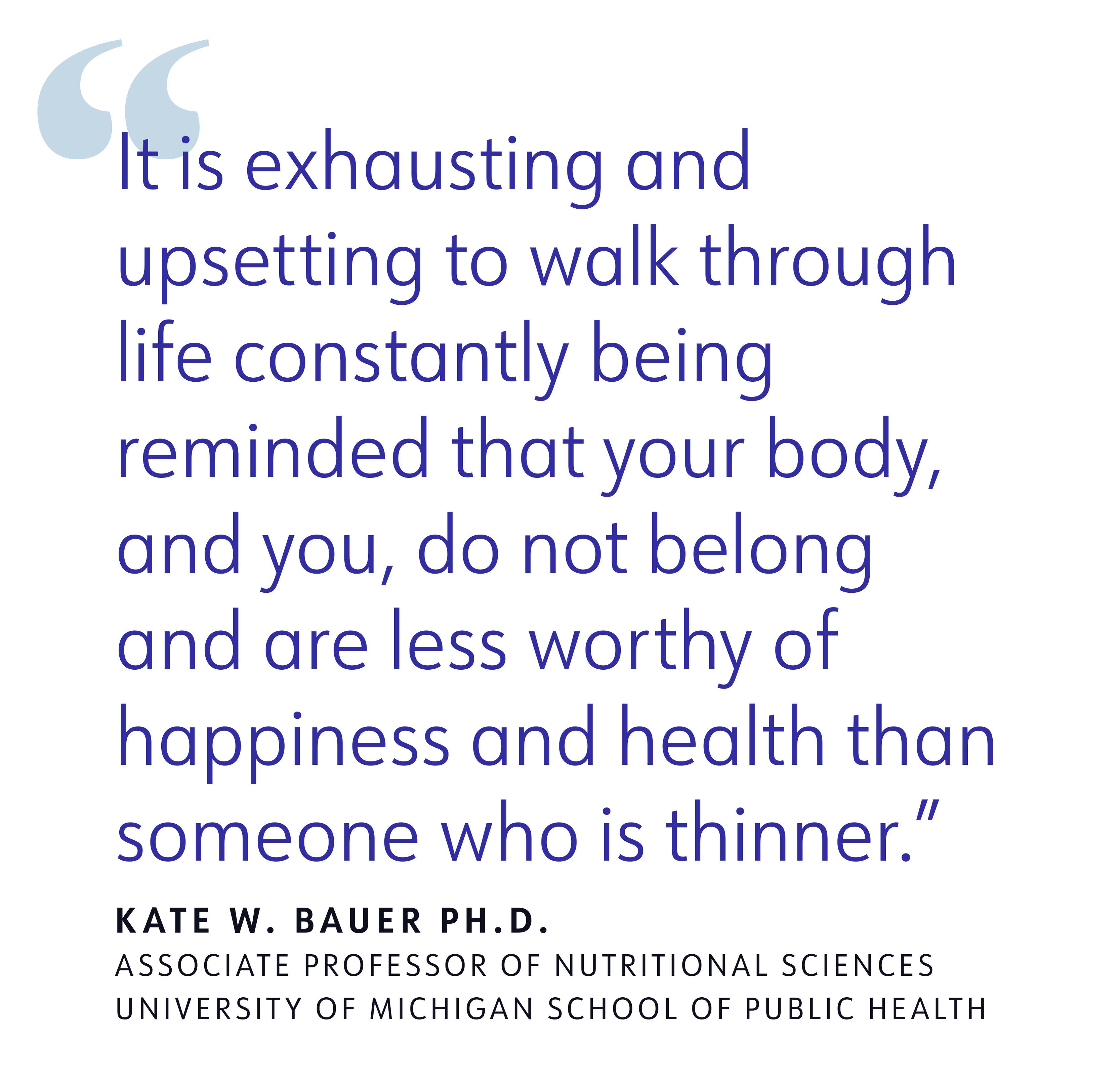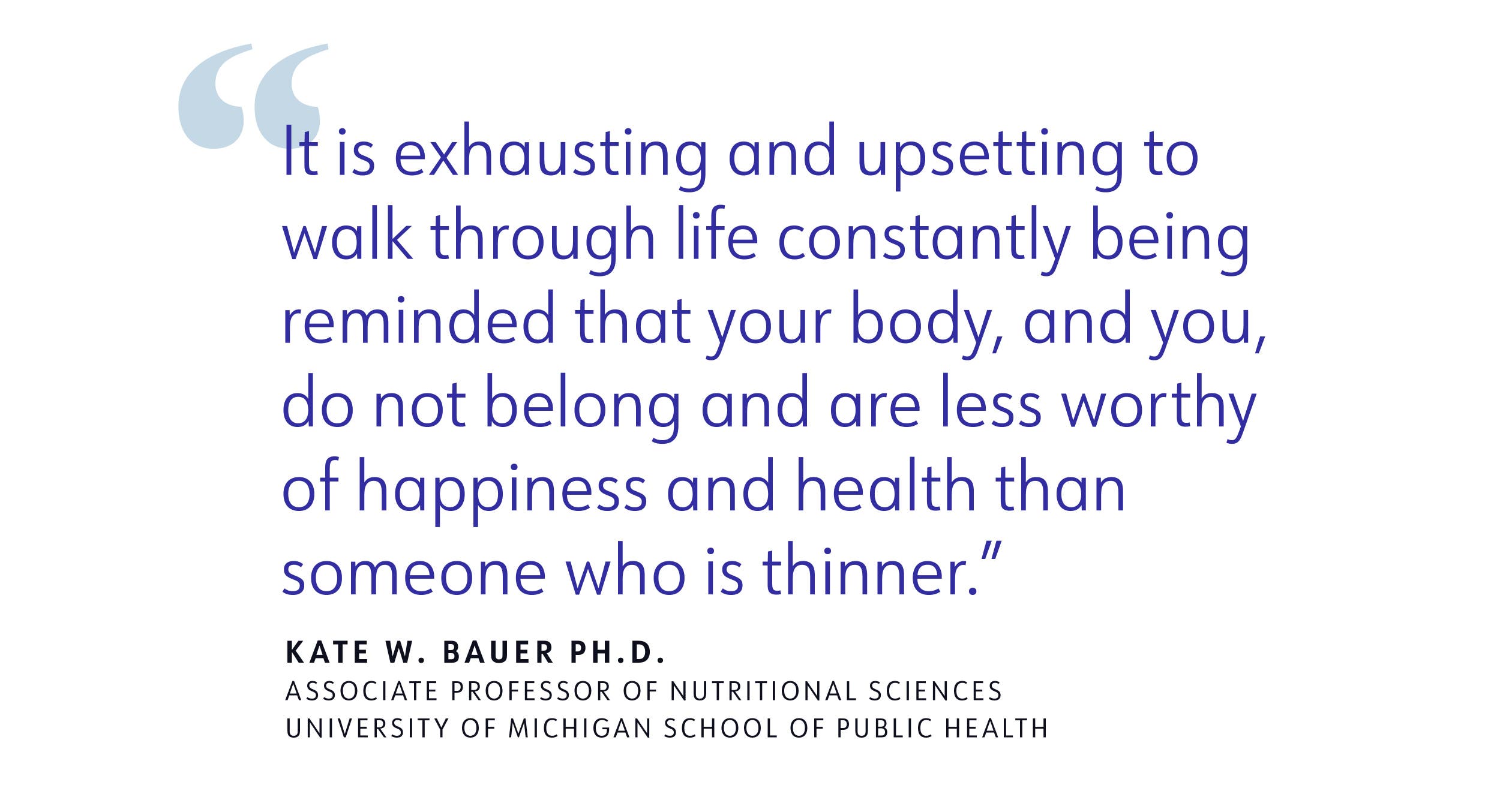How to spot (and stop) weight bias and stigma


If you've ever sat down next to someone on public transportation and heard them sigh in annoyance, been reprimanded by a relative about what’s on your plate, had a symptom blown off by your doctor as “you just need to lose weight,” or been taunted by a rude comment about your size, you’re one of millions of people who’ve experienced weight stigma.
What are weight bias and weight stigma?
Weight bias or weight stigma occur when someone is being treated differently because of their body size. Unfortunately, it’s something that people in larger bodies experience often, in settings like the doctor’s office, on a plane, at a restaurant, and more. It’s not just a little sad or awkward in the moment: experiencing weight bias and stigma can be as harmful to a person as the effects of obesity itself, according to a 2018 report.
Like other forms of discrimination, weight stigma can happen on both a personal level, like being bullied or excluded, as well as in a larger systemic or institutionalized way. And if you’ve experienced it, you’re far from alone. Over 40% of U.S. adults, across a range of sizes, report experiencing weight stigma at some point in their life, according to a 2021 study in the International Journal of Obesity.
The two concepts are closely linked, but aren’t quite the same thing. Weight bias refers to “negative thoughts or attitudes about obesity or people with higher weight or in larger bodies,” says Kate W. Bauer, Ph.D., associate professor of nutritional sciences at University of Michigan’s School of Public Health. “Weight stigma is then the discriminatory behaviors or practices against people with higher weight or in larger bodies that occur because of those negative thoughts or attitudes.” Basically, the bias is the thought; the stigma is the action.
Since the signs can be subtle, we'll go into how to spot it and ways to fight back, no matter where you encounter it.
Where do weight bias and stigma happen?
If you want a shorter answer, you might want to ask where weight bias and stigma doesn’t occur. That’s because weight stigma can emerge in almost any setting — including at schools, workplaces, doctors’ offices, and even on public transportation. “Weight stigma shows up in so many ways that many people are probably not even aware of how often they encounter it as they move through their day,” says Bauer. And it can be anything from obvious to subtle. Here are the most common places people encounter negative attitudes because of their bodies:
Healthcare settings
A doctor’s office is a place where ideally everyone feels safe and supported on their health journey, but that’s often not the case. “Patients with higher body weight report being stigmatized from healthcare providers who express negative stereotypes and biases toward them,” says Rebecca Puhl, Ph.D., a clinical psychologist and the deputy director for The Rudd Center for Food Policy & Health at the University of Connecticut. “This can lead to poorer quality of care and communication between providers and patients. It can even lead patients to avoid healthcare.” This might mean your doctor doesn’t fully investigate a medical complaint — instead just insisting that you lose weight — or a misdiagnosis instead of doing a referral or further testing. Even things like the size of blood pressure cuffs, chairs in the waiting room, and hospital gowns can be stigmatizing for people with larger bodies.
Getting around
The most basic of things — how far a table is from the booth at a restaurant, or the width of an airplane seat, for example — are not sized to easily accommodate people in bigger bodies, which is a form of discrimination. Then there are the responses you may get, like side-eye or an audible sigh from passengers when someone in a larger body is seated next to them. If it feels like the person is signaling to you, even nonverbally, “you should have a smaller body,” that’s weight stigma.
At work
In the workplace, “people face prejudice and unfair treatment because of their weight, which can happen at the level of hiring, but also in regard to promotion potential and job termination,” says Puhl. Those living with obesity also tend to have lower incomes, something researchers say is partly due to stigma. Weight bias at work could mean “an office that only has narrow chairs that not everyone can comfortably fit into,” says Bauer. Or it could show up as “someone making derogatory ‘jokes’ about people with higher weight.”
With friends, family, and partners
Have you ever had a relative make a pointed remark about what’s on your plate or when (like everyone else at the table) you say yes to dessert? That’s weight stigma. “Family members are one of the most common sources of weight teasing and judgmental comments about weight,” says Puhl. This can be especially hard on teens, with one study showing that adolescents felt more insecure, embarrassed, and hurt when parents brought up their weight in critical ways.
What part does the media play in weight bias?
It can be hard to say exactly where someone’s weight bias comes from, but popular media definitely reinforces the wrong-headed idea that people in larger bodies are somehow less worthy. “We see negative weight-based stereotypes and stigmatizing portrayals of people with higher weight in television, film, news, social media, and advertising,” says Puhl. “As an example, my research team found that about two-thirds of news reports about obesity contain images that portray people in ways that reinforce negative weight stereotypes,” such as pictures showing people in larger bodies as lazy, sloppy, or undisciplined.
It’s not just the news — body shaming and weight bias remains a constant in television and film, whether it’s a reality TV show, sitcom, or cartoon. “In TV shows, the stars are often thin, while the funny sidekicks or less desirable people are heavier,” says Bauer. And it starts young: Researchers have studied top-grossing children’s movies and found that over 80% contain content that promotes weight stigma, and that more than half of youth-targeted TV shows contain negative comments about the appearance of a character with a larger body, says Puhl. When you’re continually exposed to these sorts of characterizations from a young age, it can’t help but burrow into your psyche. Without even realizing it, many people see larger bodies negatively and internalize that being heavy is bad (both for other people’s bodies and their own).
The health impacts of weight bias and weight stigma
There are still people who believe that “encouraging” someone to lose weight can be a powerful motivator and ultimately help someone improve their health, but the truth is quite the opposite. “There seems to be a belief that heavier people don't know they're heavier, and if someone just told them then they'd ‘wake up’ and change, but that is absolutely not true,” says Bauer. Being shamed or stigmatized about weight can be harmful in multiple aspects of a person’s life. These include:
- Emotional well-being: Weight stigma can contribute to increased depression, anxiety, lower self-esteem, and poorer body image — and even raise the risk of suicidality. “It is exhausting and upsetting to walk through life constantly being reminded that your body, and you, do not belong and are less worthy of happiness and health than someone who is thinner,” says Bauer. “Heavier people are always on guard, worried they will be insulted or dismissed or just ‘take up too much space.’”
- Physical health: The constant stress of feeling stigmatized against can raise your risk of health problems such as high blood pressure, type 2 diabetes, and cardiovascular disease. Stress and its chronically higher levels of cortisol can make it harder for your body to regulate inflammation and can increase visceral fat levels, two things that are linked to many chronic health conditions. Weight stigma can even lead to weight gain and ultimately increase the risk of mortality. It doesn’t help that, as Puhl notes, weight stigma leads people to avoid physical activity due to a fear of being judged.
- Level of healthcare: “People with higher weights go to the doctor and are told losing weight will solve all their health problems; they are denied evidence-based treatments because doctors don't think that they have the willpower to be compliant,” says Bauer. There may be medical equipment that’s not sized correctly for bigger bodies and doctors may also spend less time with people with higher weights. As a result, those who have larger bodies and experience stigma are less likely to go to see a healthcare provider in the future.


How can you identify if weight stigma is happening?
For the more obvious types of weight stigma, many people with higher weight are already aware that they’re being treated in a way that doesn’t make them feel good. “People know that mainstream stores don't often carry their size, or that they get stared at when they're eating or exercising,” says Bauer.
But the more subtle forms of weight stigma might be harder to pinpoint. According to Puhl, if you feel you are being treated unfairly by others because of your body weight or size, and the mistreatment can’t be explained by something else, that is weight stigma. Examples could include being passed over for a job when you were clearly the most qualified, or being told that a medical issue is simply a weight problem. “If you are being verbally teased about your weight or size, that is weight stigma. If someone is blaming or shaming you for your weight, or applying stereotypes to you because of your body size, that is weight stigma,” says Puhl. “It can look different across different situations, but at the core of these experiences are themes of being devalued, rejected, judged, blamed, or dismissed because of one’s body.”
How can you advocate for yourself?
Though of course it would be best if the person doing the stigmating had to do the work to correct the situation, that’s often not the case. Improving the situation could mean removing yourself from places and relationships where you feel stigmatized. Here’s what else you can do:
- Take stock of your mindset. “It’s vital that you know that you deserve good things and proper treatment, regardless of your weight,” says Bauer. “For some people, it might require a really strong social support system or working on the issue with a mental health professional to get there. But once you believe that, it becomes easier to stand up for yourself in difficult situations.”
- Find a better doctor. This is a big one: You want to see medical providers you feel comfortable with, especially ones that don't always turn to weight as the source of problems, says Bauer. Look for doctors that are specifically well-versed in obesity. (The Obesity Action Coalition has a great list of Obesity Care Providers.) If you feel that weight bias is happening in healthcare visits, arm yourself with information and a readiness to self-advocate, says Puhl. And if things don’t change, consider going to a new healthcare provider who can make you feel comfortable and validated. Remember: You want a provider who focuses on your weight health (the impact your weight is having on your health and well-being), not on the number on the scale.
- Keep a written record. If you feel that weight bias is impacting your career or education, Puhl suggests that you “write down the details of the discrimination that occurred, and share it with a manager or someone with authority who can help take steps to address the situation.” For example, record the date and time, what you observed or heard, and who was present during the situation. “You can also save discriminatory messages that you receive in texts, emails, or on social media, so that you have this evidence,” says Puhl.
- Talk to advocates. In workplaces, schools, and medical offices, there are people whose job is to help fight stigma. Talk to your HR department about adding obesity to your company’s anti-harassment policy or meet with a patient advocate within your healthcare group to talk about ways that providers have talked to you about your weight.
- Push back. Hear a fat joke? The Obesity Action Coalition (OAC) suggests shutting it down by saying something simple like, “These jokes are harmful and reinforce society’s stigma.” If you spot weight bias in the media, consider contacting the OAC to flag them so that their Weight Bias Task Force can address it.
- Find support in your community. Maybe your sister or BFF who have never had to think about their weight just don’t get it. Getting support from people in your in-person or virtual community (through WeightWatchers or not) can help you through the situation with the understanding and empathy you need. In fact, research shows that social support may mitigate the negative impact of weight stigma on psychological wellbeing.
- Get political. Send a letter or email to your local or state legislator to encourage them to support policy-level solutions to reduce weight bias. Only one state (Michigan) currently has legislation that explicitly bans discrimination based on body size. Weight status is not included as a protected class under the U.S. Equal Employment Opportunity Commission, the Fair Housing Act, or the Food and Nutrition Act (which prohibits discrimination in SNAP), notes Kathryn M. Ross, PhD, MPH, associate professor in the department of clinical & health psychology at the University of Florida. Your advocacy can help change that.
The bottom line
Weight bias and stigma can negatively impact people in so many ways, from raising their risk for serious health conditions and reducing the quality of their healthcare to making it harder to have a successful career or simply travel. Being a strong self-advocate and well-informed about where weight bias can occur can help you feel prepared to fight back and reduce the risk that comes from being stigmatized against — and most importantly, knowing you’re worthy no matter your size.
This content is for informational purposes only and does not constitute medical advice, diagnosis or treatment. It should not be regarded as a substitute for guidance from your healthcare provider.
WeightWatchers relies on only the most trustworthy sources, including highly credentialed experts, government and academic institutions, peer-reviewed studies, and respected medical associations. We focus on primary sources and research that is recent, relevant, and high-quality. For more about how we report, write, and fact check our stories, please see our editorial policy.
Weight stigma prevalence: International Journal of Obesity (2021). “Weight stigma and health behaviors: evidence from the Eating in America Study.” https://www.nature.com/articles/s41366-021-00814-5
